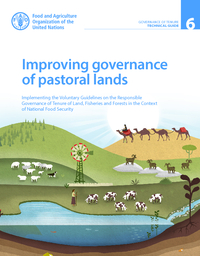Focal point
Location
The Food and Agriculture Organization of the United Nations leads international efforts to defeat hunger. Serving both developed and developing countries, FAO acts as a neutral forum where all nations meet as equals to negotiate agreements and debate policy. FAO is also a source of knowledge and information. We help developing countries and countries in transition modernize and improve agriculture, forestry and fisheries practices and ensure good nutrition for all. Since our founding in 1945, we have focused special attention on developing rural areas, home to 70 percent of the world's poor and hungry people.
Members:
Resources
Displaying 1331 - 1335 of 5074Forest Landscape Restoration for Asia-Pacific Forests
The Forest Landscape Restoration (FLR) approach, which is still in its nascent stages of development, is rapidly gaining attention as a more appropriate way to restore both degraded forests as well as the surrounding degraded landscape. The great value of this approach is that it integrates forest restoration actions with the desirable objectives of the landscape, and it is undertaken with the full participation of the people who will have a role in the management of the restored areas over the longer term.
Improving governance of pastoral lands - Implementing the Voluntary Guidelines on the Responsible Governance of Tenure of Land, Fisheries and Forests in the Context of National Food Security
The technical guide on improving the governance of pastoral lands is designed for several audiences including government and non-government actors. It covers specific challenges of pastoral tenure that are unique to pastoralism and considers how these different facets of pastoralist tenure (issues of the commons; free, prior and informed consent (FPIC); gender etc.) can be combined in a coherent approach to securing pastoral lands.
Afghanistan Agriculture Information Portal (AAIP)
The Afghanistan Agriculture Information Portal (AAIP) is a web data dissemination platform for crop production statistics and crop conditions. It manages spatial (satellite images and thematic layers) and non-spatial data (crop, climatic and hydrologic) that national or sub-national institutions generate or collect regarding crop monitoring. It aims to provide this information useful for decision-making by top management, farmers and other stakeholders in a country like Afghanistan where more than 80% of people.
Boosting Africa’s Soils
This booklet presents an overview of the issue of soil management practices in Africa. It briefly presents the 12-Resolution “Abuja Declaration on Fertilizer for the African Green Revolution” adopted in 2006 and contextualizes the 2014 adoption by the 23rd Summit of the African Union of the Malabo Declaration on Accelerated Agricultural Growth and Transformation for Shared Prosperity and Improved Livelihoods that reaffirmed that agriculture should remain high on the development agenda of the continent.
Forestry Contribution to National Economy and Trade in Ethiopia, Kenya and Uganda
The economic contributions of forests in Eastern African countries have not received the desired attention in terms of policy and budgetary allocation needed for sustained growth of these forests. This, among other reasons, has led to the reduction of forest zones and an increase in the import of forest-related products, resulting in dwindling foreign currency reserves.








